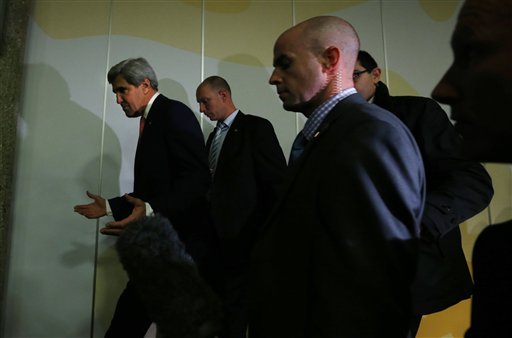(AP) Iran’s Rouhani says uranium enrichment `red line’
By NASSER KARIMI
Associated Press
TEHRAN, Iran
Iranian officials said Sunday the country made progress with world powers during “serious” talks over Tehran’s nuclear program, but insisted the nation cannot be pushed to give up uranium enrichment as negotiations move into tougher ground over ways to ease Western concerns that Iran could one day develop atomic weapons.
The remarks on enrichment repeat past declarations on the country’s “right” to produce nuclear fuel, which is a key element of the talks over its scope. But President Hassan Rouhani and his top envoys seek to assure hard-line critics that Iran will not make sweeping concessions in the negotiations, which ended without agreement in Geneva early Sunday and are scheduled to resume next week.
All sides proclaimed progress, but noted obstacles such as France’s worries over Iran’s enrichment levels and a planned heavy water reactor that produces plutonium byproducts. On Saturday, state TV lashed out at the French position, calling the country Israel’s “representatives” at the talks.
Foreign Minister Mohammad Javad Zarif, in a posting on his Facebook page Sunday, said there are “some problems” still to overcome, but called the latest round of negotiations with the six-nation group _ the five permanent U.N. Security Council members plus Germany _ “serious but respectful.”
The West and its allies fear Iran’s uranium enrichment labs could one day produce weapons-grade material. But, in an important shift, the U.S. and others no longer appear to demand a complete halt to enrichment and are concentrating on curbing the highest-level production, currently at 20 percent. Such material is needed for Iran’s lone research reactor, which makes isotopes for medical treatments, but is only just several steps away from warhead level at more than 90 percent enrichment. Energy-producing reactors use uranium enriched at levels of about 3.5 percent.
Iran insists it does not seek nuclear weapons and says its reactors are only for electricity and medical applications.
In an address to parliament, President Hassan Rouhani said uranium enrichment is a “red line” that cannot be crossed.
Iran claims it cannot be forced to give up enrichment because it has signed a U.N. treaty governing the spread of nuclear technology. The pact allows for enrichment under U.N. monitoring.
Israeli Prime Minister Benjamin Netanyahu has criticized what he considers readiness by the six powers to be too generous to Tehran for not enough in return. The U.S and others are considering easing economic sanctions in return for a possible suspension in 20 percent enrichment.
Rouhani said Iran is similar to other countries and “we are not ready to accept discrimination, at all.”
In the latest Geneva rounds, which began Thursday, there were growing expectations of an accord. France, however, would not soften its concerns, claiming the deal offered didn’t go far enough to trim Iran’s nuclear program.
French Foreign Minister Laurent Fabius told France-Inter Radio that his nation does not want to be part of a “con game.” He did not elaborate, but it appeared France wanted tougher constraints on a reactor that will make plutonium when completed, and on parts of Iran’s uranium enrichment program.
The plutonium byproduct from the reactor can be used to make nuclear weapons, but the process to extract it requires specific technology that Iran currently does not possess.
As the talks foundered after initial signs of progress, U.S. Secretary of State John Kerry rushed to Geneva on Friday, followed by counterparts from Russia, China, Britain, France and Germany, to try to push through an agreement. Kerry said “significant progress” had been made on the remaining differences, but noted there were “certain issues that we needed to work through.” The next round of talks is set for Nov. 20.
Still, Kerry’s talks in Geneva were the longest high-level negotiations between Iran and the United States in decades _ a sign of the improved atmosphere between the two countries since moderate-leaning Rouhani took office in August.
Kerry came to Geneva from Tel Aviv, where he met with Netanyahu. Kerry addressed concerns by Israel and others, saying he understood the `’the very strong feelings about the consequences of the choices we face for our allies, and we respect that.”
He held out hope for a deal `’in the course of the next weeks,” adding: `’We are closer now … than we were when we came.”
___
Associated Press writers John Heilprin, George Jahn and Matthew Lee in Geneva, Jamey Keaten in Paris and Brian Murphy in Dubai, United Arab Emirates, contributed to this report.

COMMENTS
Please let us know if you're having issues with commenting.